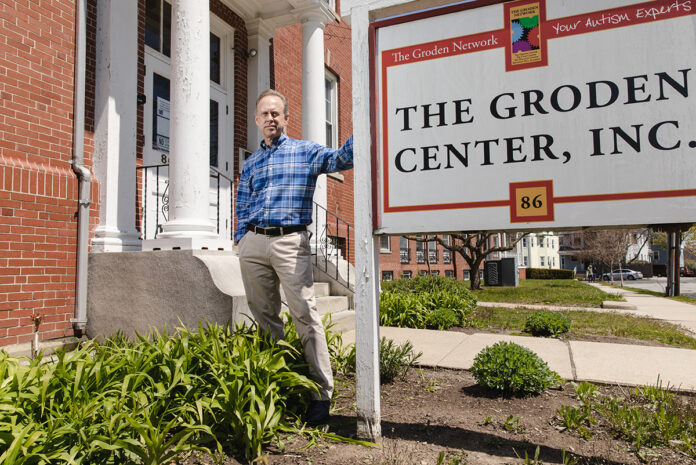
C-SUITE AWARDS 2020 CHIEF CLINICAL OFFICER, NONPROFIT/SOCIAL SERVICE AGENCIES: Cooper Woodard | The Groden Network
AS A MEDICAL STUDENT at Allegheny College in Pennsylvania, Cooper Woodard quickly learned that medicine was not the right path for him.
“I did not do well in chemistry,” Woodard said. “But then I took abnormal psychology as an elective and it was absolutely fascinating to me. For the first time, I could not put the textbook down.”
Woodard recalled that he went to the college’s psychology department to find out more about this area and was “amazed by all the information and topics.” He knew right away that he wanted to be a psychologist, he said.
“I have enjoyed it ever since,” Woodard said. “I feel very fortunate to have known what I wanted to do so early in life.”
Fortunate indeed for both Woodard and the many children, teens and adults with learning and behavioral disabilities he helped through his work as The Groden Network’s chief clinical officer since 2002.
The network includes The Groden Center, founded in 1976 by Drs. June and Gerald Groden in response to the absence of effective services for youths with autism and other developmental challenges. The Providence-based organization currently offers day and residential programs providing functional skill and social development for youths ages 3-21 via The Cove Center in Providence and The Halcyon Center in Attleboro.
Woodard has been part of many programs that have forwarded the network’s mission. One he is particularly proud of is the residential intensive treatment and evaluation program, a community-based, staff-secured setting where clients receive behavioral and psychiatric assessment support and stabilization.
‘[People with autism and developmental disabilities] are vulnerable and need support, and I am so glad to be able to do anything to help.’
COOPER WOODARD, The GrodenNetwork’s chief clinical officer
Woodard and his team found that some of the children and adolescents supported by the center may be in crisis but did not need hospitalization or were in need of “step-down” services from a hospital setting. The 1-to-1 RITE program, which also offers parent training and case management, has effectively served many individuals with autism and developmental disabilities without them having to go to, or be maintained in, an inpatient setting.
A story from Woodard’s childhood encapsulates who he is and the passion that he brings to his work. At the age of 11, Woodard was allowed to pick out a new kitten from a litter. He picked out one of the kittens, but then noticed another kitten that didn’t look quite right.
“I asked the neighbor about that kitten and she said, ‘You don’t want that one. It’s the runt. No one wants the runt,’ ” Woodard recalled. “I couldn’t believe that she would say such a thing and I put my kitten down and took that one. I worked with him and he became one of the most beautiful cats.”
Woodard said he always felt badly for people who are different or vulnerable and it’s “physically painful” for him to see someone in pain. People with autism and other disabilities are in that situation, Woodard said.
“They are vulnerable and need support, and I am so glad to be able to do anything to help,” he said. “It is a gift to me to be able to be of service in that way.”
Groden replaced its clinical supervisor model with board-certified behavior analysts, worked to reduce medication use and restrictive interventions by enhancing behavioral interventions, and maintained Dr. June Groden’s contributions of progressive relaxation and cognitive picture rehearsal techniques for all children. It also increased the use of positive psychology interventions for individuals with autism and developmental disabilities, and expanded vocational and employment supports.
Catherine Nassa, Groden’s director of marketing and development, has seen firsthand how much Woodard’s work impacts people’s lives.
“At its core, Cooper’s work helps our students and clients develop coping skills so that they can better interact with their families and their community,” Nassa said. “This allows them to live more productive and meaningful lives. Cooper is willing to listen to all sides of an issue before making a decision. He is also willing to jump in wherever necessary.”












